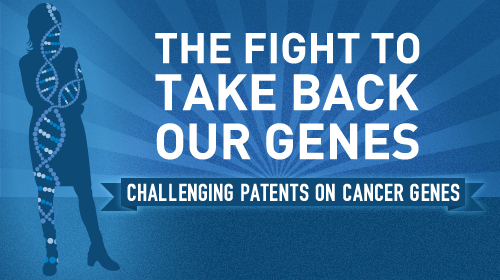
Even though they’ve been in our families since the dawn of man, our genes do not belong to us. They’ve been claimed by companies that hold patents on the DNA from our cells. Over the past 20 years, at least 41 percent of our genes have become the intellectual property of corporations. These patent claims contradict an intuitive sense that our DNA is no less ours than our lungs or kidneys. More importantly, these patents, covering thousands of human genes, restrict our doctors’ ability to look at our DNA and plan ahead for our medical treatment.
On April 15th, there is a chance for the United States Supreme Court to correct this genetic injustice and remove the limitations to our DNA. The court is reviewing Association of Molecular Pathologists (AMP) v. Myriad Genetics, in which a federal court ruled last year that human genes can be patented. Myriad Genetics received patents in the 1990s for the exclusive right to examine all isolated DNA that contains the BRCA1 and BRCA2 genes. The implications for our health could not be greater.
Women who carry mutations of BRCA have a much higher risk of breast or ovarian cancer, jumping from a 10 percent lifetime risk to an 85-90 percent chance of cancer. Because of Myriad’s patents, a woman’s doctor cannot look at her genetic code in the BRCA genes, since as soon as blood is drawn and DNA is isolated from your body to examine the BRCA genes, it is the property of Myriad Genetics and only Myriad Genetics can screen for these mutations.
This monopoly means that any woman in America who wants to have her DNA tested for these potentially life-threatening mutations has no choice but to use the services of Myriad Genetics, without the possibility of a second, independent test, or a more thorough test.
These patents have also made the costs of crucial genetic screening prohibitive to many. The price for a BRCA screening by Myriad Genetics is $3,000 whereas any of the hundreds of clinical laboratories around the country could and would perform the test for under $200.
Worse, the restrictions of Myriad’s patents are not just limited to breast cancer genes. A closer look at Myriad’s patents reveals that they claim any short sequence of DNA having, “at least 15 nucleotides” of the BRCA1 gene, which means they own an unacceptably broad range of the genome.
We’ve published a study this month that found the short sequences in BRCA1 also cover 689 other genes. These genes extend far beyond the realm of breast cancer to brain development and proper cardiac functioning. This non-specificity shows why patents on short, indiscriminate DNA sequences should never have been issued.
Like a majority of scientists and the American Medical Association, we believe that the Supreme Court should rule that the genes of the human genome, just like other body part, belong to their owners, not to companies. If the court allows these types of patents to stand, they are elevating ill-conceived property rights above researching, preventing and treating lethal diseases. That is untenable.
When asked in 1955 if he patented the polio vaccination, its inventor Dr. Jonas Salk noted that the vaccine was simply an inactive form of the polio virus and replied, “There is no patent. Could you patent the sun?” Now, 58 years later on April 15th, the Supreme Court will answer that question about what in the natural world can be patented. For the sake of science, medical research and our health, we hope the answer is no.
Jeffrey Rosenfeld is an Assistant Professor of Medicine at the New Jersey Medical School and a member of the High Performance and Research Computing Group. Christopher E. Mason is an Assistant Professor of Computational Genomics at Weill Cornell Medical College and Affiliate Fellow of the Information Society Project of Yale Law School.
Learn more about human gene patenting and other civil liberty issues: Sign up for breaking news alerts, , and .


